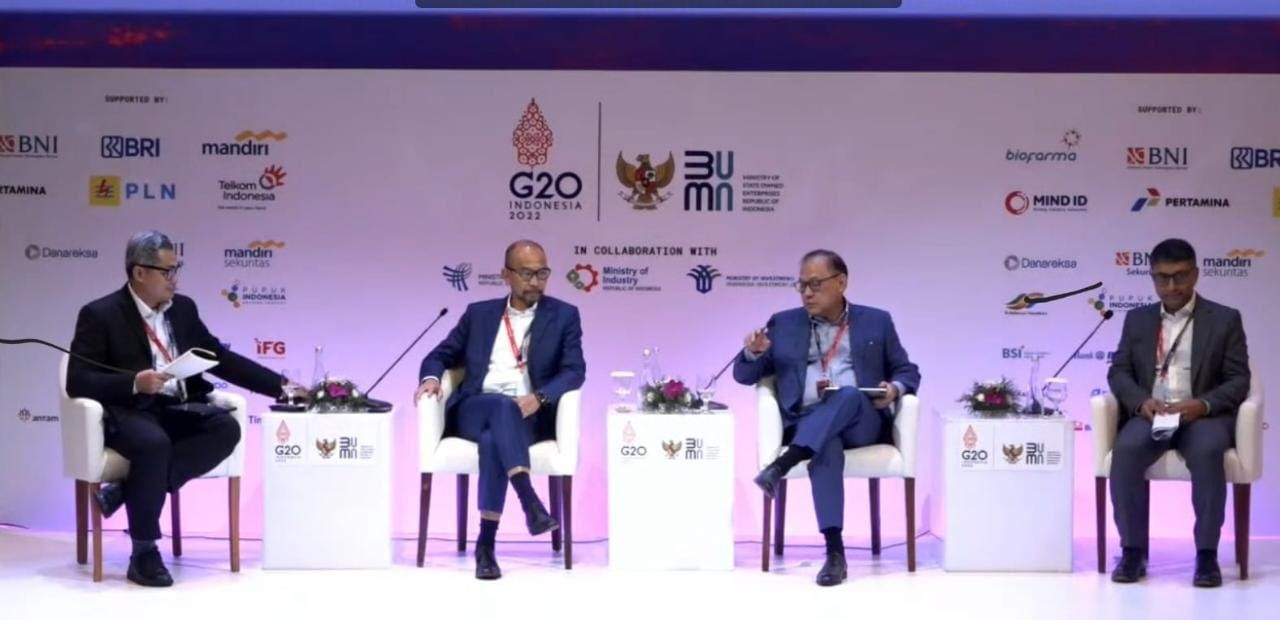Popular Reads
Top Results
Can't find what you're looking for?
View all search resultsPopular Reads
Top Results
Can't find what you're looking for?
View all search resultsIndonesia remains stable in the face of global economic recession
The world is facing uncertainty as the threat of a global recession looms. Recession due to multiple crises might be caused by overly high inflation, a disrupted food supply chain, tightening global liquidity and the heating geopolitical climate.
Change text size
Gift Premium Articles
to Anyone
 Bank Mandiri chief economist Andry Asmoro (left), former finance minister (2013-2014) Chatib Basri (second left), former Bank Indonesia governor (2013-2018) and BNI president commissioner Agus Martowardjojo (second right) and World Bank lead economist Habib Rab at the SOEs International Conference at the Bali Nusa Dua Conference Center on Tuesday.
Bank Mandiri chief economist Andry Asmoro (left), former finance minister (2013-2014) Chatib Basri (second left), former Bank Indonesia governor (2013-2018) and BNI president commissioner Agus Martowardjojo (second right) and World Bank lead economist Habib Rab at the SOEs International Conference at the Bali Nusa Dua Conference Center on Tuesday.
T
he world is facing uncertainty as the threat of a global recession looms. Recession due to multiple crises might be caused by overly high inflation, a disrupted food supply chain, tightening global liquidity and the heating geopolitical climate. The effects of this global challenge may be slowed down when all countries work together for a solution that benefits all.
At the same time, Indonesia is in a considerably better position compared with other countries. The performance of the national economy has in fact been getting stronger. This has mainly been driven by the positive trend in economic growth that is maintained at 5 percent, exchange rate stability and manageable inflation.
“This demonstrates a strong domestic stability along with a strengthening economic fundamentals,” said former Bank Indonesia governor (2013-2018) and of PT Bank Negara Indonesia (Persero) Tbk (BNI) president commissioner Agus Martowardjojo at the Bali Nusa Dua Conference Center on Tuesday.
Agus added that Indonesia’s banking sector is currently in an excellent condition due to strong financing and improved implementation of risk management. The government is certain that the 2022 economic growth will grow past the targeted 5 percent considering the healthy national consumer spending rate and Indonesia’s progressive performance in exports.
“We are seeing a possibility that inflation will rise. However, an excellent export performance will ensure currency stability that will also positively affect domestic economic stability,” he added.
According to Agus’s observation, monetary and fiscal policies have so far helped propel the post-pandemic recovery. Despite meeting tremendous challenges, he is still optimistic that the fiscal and monetary authorities have enforced their pre-emptive and forward-looking policies very well.
In the future, the balance between fiscal policies and monetary policies must be kept in balance to strengthen the developing economic structure.
All players in the economy must also remember that there is an arising opportunity from the vigorous performance of sustainable economic segments that encourage the chance to grow for real economic actors and players in the financial sector.
“The acceleration of digital transformation is also another key factor. Furthermore, the need for digital solutions in anticipation of future generations is also on the rise,” he added.
Previously, BNI president director Royke Tumilaar said that the banking sector was relatively more prepared in the current situation. In a time when low interest rates are the norm, proactive banking prevents sudden shocks that disrupt the transmission of economic growth.
“Our colleagues in the banking industry have been responding appropriately to the hike in interest rates today. The era of low interest rates has ended and we are not turning back,” he said.
Royke added that BNI had yet to automatically increase deposits or credit interest rates. In fact, the economic performance of loyal customers is prioritized by BNI in accommodative interest rate policies.
“New customers will receive new interest rates, but the loyalty to our customers is important. Besides, there is no need to increase interest rates since the fundamentals of the Indonesian economy are still very good,” he concluded.









